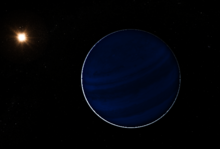HD 4313 b
 An artist's impression of HD 4313 b orbiting its parent star. | |
| Discovery[1] | |
|---|---|
| Discovered by | Johnson et al. |
| Discovery site | Keck Observatory |
| Discovery date | 2010-03-17 |
| Doppler spectroscopy | |
| Orbital characteristics[2] | |
| 1.157±0.097 AU | |
| Eccentricity | 0.147±0.047 |
| 356.21±0.88 d | |
| 2454816±12 JD | |
| 102±13 º | |
| Semi-amplitude | 40.3±1.7 m/s |
| Star | HD 4313 |
| Physical characteristics | |
Mean radius | ~1.2 RJ |
| Mass | ≥1.927±0.090 MJ[2] |
| 69.25 m/s2 | |
| Temperature | 479.9 K (206.8 °C; 404.1 °F) |
HD 4313 b is an extrasolar planet orbiting the K-type star HD 4313 approximately 447 light years away in the constellation Pisces.[1] This planet was discovered using the Doppler spectroscopy (radial velocity) method.
Discovery[]
HD 4313 was discovered by a group of scientist at the Keck Observatory on March 17, 2010 using the Doppler spectroscopy method, which is detecting a planet by the star's change in wobbling.
Properties[]
Orbit[]
HD 4313 has a orbital period similar to Earth, with an orbit of approximately, 356 days.[3] Its orbit distance is similar, about 1 AU away from its host star.[3] According to the latest data, this planet has a somewhat eccentric orbit.[3]
Physical characteristics[]
HD 4313 has a mass only 92.7% greater than that of Jupiter, but its radius and inclination is unknown, so the true mass and radius can't be studied. A best estimate of the radius is 1.2 times that of Jupiter.[4]
See also[]
References[]
- ^ a b Johnson, John Asher; et al. (2010). "Retired a Stars and Their Companions. IV. Seven Jovian Exoplanets from Keck Observatory". Publications of the Astronomical Society of the Pacific. 122 (892): 701–711. arXiv:1003.3445. Bibcode:2010PASP..122..701J. doi:10.1086/653809.
- ^ a b Luhn, Jacob K.; et al. (2019). "Retired A Stars and Their Companions. VIII. 15 New Planetary Signals around Subgiants and Transit Parameters for California Planet Search Planets with Subgiant Hosts". The Astronomical Journal. 157 (4). 149. arXiv:1811.03043. Bibcode:2019AJ....157..149L. doi:10.3847/1538-3881/aaf5d0.
- ^ a b c "Exoplanet Archive". exoplanetarchive.ipac.caltech.edu. Retrieved 2020-12-11.
- ^ "Exoplanet-catalog". Exoplanet Exploration: Planets Beyond our Solar System. Retrieved 2020-12-11.
External links[]
- "HD 4313 b". The Extrasolar Planets Encyclopaedia.
Coordinates: ![]() 00h 45m 40s, +07° 50′ 42″
00h 45m 40s, +07° 50′ 42″
- Exoplanets discovered in 2010
- Exoplanets detected by radial velocity
- Pisces (constellation)
- Giant planets